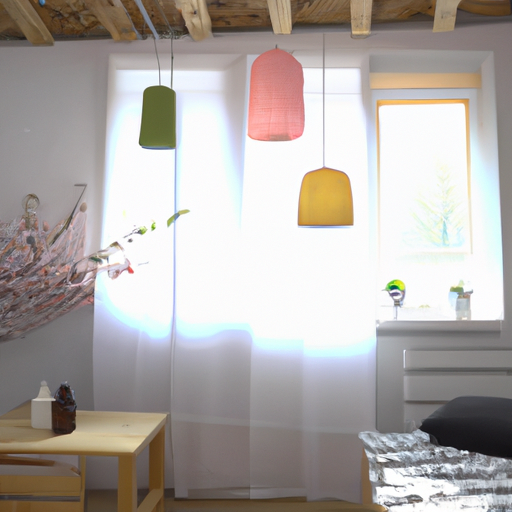Revolutionizing Interior Design: AI’s Impact on Modern Home Aesthetics
The role of artificial intelligence (AI) in modern home design is rapidly evolving, transforming the way we conceptualize, plan, and execute interior design projects. As technology continues to advance, AI is becoming an increasingly integral part of the design process, offering innovative solutions to age-old challenges and revolutionizing the aesthetics of contemporary living spaces. This article will explore the various ways in which AI is impacting modern home aesthetics, from streamlining the design process to enabling more personalized and sustainable living environments.
One of the most significant ways in which AI is revolutionizing interior design is by streamlining the design process itself. Traditionally, interior design has been a labor-intensive and time-consuming process, involving multiple consultations, site visits, and revisions. However, AI-powered design tools are now enabling designers to create detailed, accurate, and visually stunning 3D renderings of living spaces in a fraction of the time it would take using conventional methods. These tools can analyze a room’s dimensions, layout, and lighting conditions, and then generate a range of design options based on the user’s preferences and requirements. This not only saves time and resources but also allows designers to experiment with different styles, color schemes, and furniture arrangements, ultimately resulting in more innovative and visually appealing living spaces.
Another way in which AI is impacting modern home aesthetics is by enabling more personalized and tailored design solutions. In the past, interior design has often been dictated by prevailing trends and styles, with homeowners having limited input into the overall look and feel of their living spaces. However, AI-powered design platforms are now allowing users to input their own preferences, tastes, and requirements, resulting in living spaces that are uniquely tailored to their individual needs and personalities. This level of personalization is particularly important in today’s fast-paced, globalized world, where people are increasingly seeking to create living environments that reflect their own unique identities and lifestyles.
In addition to streamlining the design process and enabling more personalized living spaces, AI is also playing a crucial role in promoting sustainability in modern home design. As concerns about climate change and resource depletion continue to grow, there is an increasing demand for eco-friendly design solutions that minimize environmental impact while still delivering aesthetically pleasing living spaces. AI-powered design tools can help to achieve this by analyzing a range of factors, such as energy consumption, material usage, and waste production, and then generating design solutions that optimize these factors. This can result in living spaces that are not only visually appealing but also environmentally responsible, helping to reduce the ecological footprint of modern homes.
Finally, AI is also transforming the way in which we interact with our living spaces, with the rise of smart home technology enabling more intuitive and responsive home environments. AI-powered devices, such as voice-activated assistants, smart lighting systems, and automated climate control, are becoming increasingly commonplace in modern homes, allowing homeowners to control and customize their living environments with unprecedented ease and precision. This not only enhances the overall aesthetic appeal of living spaces but also contributes to a more comfortable and efficient living experience.
In conclusion, the role of AI in modern home design is multifaceted and far-reaching, with the potential to revolutionize the way we conceive, plan, and execute interior design projects. By streamlining the design process, enabling more personalized and sustainable living spaces, and transforming the way we interact with our home environments, AI is poised to have a profound and lasting impact on the aesthetics of modern homes. As technology continues to advance, it is likely that we will see even more innovative and exciting applications of AI in the realm of interior design, further shaping the look and feel of the homes of the future.
Smart Homes and AI: Enhancing Functionality in Contemporary Living Spaces

The role of artificial intelligence (AI) in modern home design is becoming increasingly significant as technology continues to advance and integrate into our daily lives. Smart homes, which are residences equipped with advanced automation systems that allow homeowners to control various aspects of their living spaces, are becoming more prevalent. These systems are designed to enhance the functionality of contemporary living spaces, making them more efficient, comfortable, and convenient. AI plays a crucial role in the development and operation of these smart home systems, as it enables them to learn from the habits and preferences of their users, and adapt accordingly.
One of the primary ways AI is being utilized in modern home design is through the integration of smart home devices and appliances. These devices, which include everything from thermostats and lighting systems to security cameras and kitchen appliances, are designed to communicate with one another and with the homeowner through a central hub or mobile app. This interconnectedness allows for seamless control over various aspects of the home, and AI algorithms can analyze the data collected from these devices to optimize their performance and efficiency.
For example, a smart thermostat can learn the preferred temperature settings of the homeowner and adjust the heating and cooling systems accordingly, ensuring optimal comfort while also conserving energy. Similarly, AI-powered lighting systems can analyze the natural light levels in a room and adjust the artificial lighting accordingly, reducing energy consumption and creating a more pleasant atmosphere. These energy-saving features not only benefit the environment but also result in significant cost savings for homeowners.
In addition to optimizing energy consumption, AI can also enhance the security and safety of modern homes. AI-powered security systems can analyze the behavior of individuals within the home and detect any unusual activity, such as an intruder or a potential hazard like a fire or gas leak. These systems can then alert the homeowner or emergency services, ensuring a rapid response to any potential threats. Furthermore, AI can be used to monitor the health and well-being of the home’s occupants, particularly the elderly or those with medical conditions. By analyzing data from wearable devices and other health monitoring systems, AI can detect any changes in an individual’s health and alert caregivers or medical professionals if necessary.
Another area where AI is making a significant impact on modern home design is in the realm of personalization and customization. AI algorithms can analyze the preferences and habits of homeowners, allowing them to tailor their living spaces to their unique needs and tastes. For example, AI can suggest interior design elements, such as furniture and color schemes, based on the homeowner’s preferences and the layout of the space. This level of personalization can create a more comfortable and enjoyable living environment for the homeowner.
Finally, AI is also playing a role in the construction and design process of modern homes. By analyzing data from various sources, such as building codes, environmental factors, and homeowner preferences, AI can assist architects and designers in creating more efficient and sustainable homes. This can result in homes that are better suited to their environments and the needs of their occupants, ultimately improving the overall quality of life for those who reside in them.
In conclusion, the role of AI in modern home design is multifaceted and continues to grow in importance as technology advances. From optimizing energy consumption and enhancing security to personalizing living spaces and assisting in the design process, AI is revolutionizing the way we live and interact with our homes. As AI continues to develop and become more integrated into our daily lives, we can expect to see even more innovative and intelligent solutions for enhancing the functionality of contemporary living spaces.
The Future of Sustainable Architecture: AI’s Contribution to Eco-Friendly Home Design
The role of artificial intelligence (AI) in modern home design is becoming increasingly significant as the world moves towards a more sustainable and eco-friendly future. As the demand for energy-efficient and environmentally responsible living spaces grows, architects and designers are turning to AI to help them create homes that not only look good but also have a minimal impact on the environment. In this article, we will explore how AI is contributing to the future of sustainable architecture and the ways in which it is revolutionizing eco-friendly home design.
One of the primary ways AI is being utilized in sustainable architecture is through the optimization of energy consumption. By analyzing vast amounts of data on weather patterns, sunlight exposure, and the thermal properties of building materials, AI algorithms can help architects design homes that are more energy-efficient. This can be achieved by strategically placing windows and skylights to maximize natural light, selecting materials with high thermal mass to regulate indoor temperatures, and incorporating passive solar design principles to reduce the need for artificial heating and cooling. The result is a home that consumes less energy, reduces greenhouse gas emissions, and lowers utility bills for homeowners.
Another area where AI is making a significant impact on eco-friendly home design is in the realm of smart home technology. AI-powered devices such as thermostats, lighting systems, and appliances can learn from homeowners’ habits and preferences, adjusting settings automatically to conserve energy and reduce waste. For example, a smart thermostat can learn when a homeowner typically leaves for work and returns home, adjusting the temperature accordingly to minimize energy consumption. Similarly, AI-enabled lighting systems can detect when a room is unoccupied and turn off lights to save electricity. These intelligent systems not only make homes more comfortable and convenient but also contribute to a more sustainable future by reducing energy consumption and waste.
AI is also playing a crucial role in the development of new, eco-friendly building materials. Researchers are using AI algorithms to analyze the properties of various materials and identify those with the greatest potential for reducing a building’s environmental impact. This can include materials that are more energy-efficient, have a lower carbon footprint, or are made from renewable resources. By incorporating these innovative materials into their designs, architects can create homes that are not only visually appealing but also have a minimal impact on the environment.
In addition to optimizing energy consumption and promoting the use of eco-friendly materials, AI is also being used to improve the overall design process. By using AI algorithms to analyze and predict the performance of various design elements, architects can make more informed decisions about which features to include in a home. This can lead to more efficient and effective designs that are better suited to the needs of homeowners and the environment. Furthermore, AI can help architects identify potential issues and challenges early in the design process, allowing them to address these concerns before construction begins. This can save time, money, and resources, ultimately contributing to a more sustainable future.
In conclusion, the role of AI in modern home design is becoming increasingly important as the world moves towards a more sustainable and eco-friendly future. By optimizing energy consumption, promoting the use of innovative materials, and improving the overall design process, AI is revolutionizing the way we approach eco-friendly home design. As AI technology continues to advance and become more accessible, we can expect to see even more exciting developments in the field of sustainable architecture. By embracing these innovations, architects, designers, and homeowners alike can contribute to a greener, more sustainable future for generations to come.
Q&A
Question 1: How does AI contribute to energy efficiency in modern home design?
Answer 1: AI contributes to energy efficiency in modern home design by optimizing heating, cooling, and lighting systems, learning the occupants’ habits and preferences, and making real-time adjustments to minimize energy consumption while maintaining comfort.
Question 2: How does AI enhance home security in modern home design?
Answer 2: AI enhances home security in modern home design by integrating smart security systems, such as facial recognition, motion detection, and anomaly detection, to provide real-time alerts and notifications to homeowners, allowing for quick response to potential threats or intrusions.
Question 3: How does AI improve the overall functionality and convenience of modern homes?
Answer 3: AI improves the overall functionality and convenience of modern homes by enabling smart home automation, allowing homeowners to control various aspects of their home, such as lighting, temperature, and appliances, through voice commands or mobile applications, and by providing personalized recommendations based on the occupants’ preferences and habits.
Conclusion
In conclusion, the role of AI in modern home design is significant and transformative, as it enhances efficiency, personalization, and sustainability. AI-driven technologies, such as smart home systems and virtual assistants, are revolutionizing the way people interact with their living spaces, leading to more comfortable, convenient, and environmentally friendly homes. As AI continues to advance, its impact on home design will only grow, shaping the future of residential architecture and interior design.


